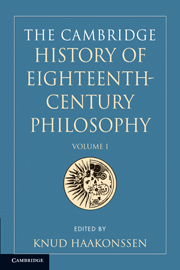Book contents
- Frontmatter
- CONTENTS
- Preface
- Methods of reference and abbreviations
- List of contributors
- I The Concept of Eighteenth-Century Philosophy
- II The Science of Human Nature
- 7 Philosophical Methods
- 8 Human Nature
- 9 Perception and Ideas, Judgement
- 10 Self-Consciousness and Personal Identity
- 11 Reason
- 12 Substances and Modes, Space and Time
- 13 Causality
- 14 Knowledge and Belief
- 15 Scepticism
- 16 Philosophy of Language
- 17 Rhetoric
- 18 Aesthetics
- 19 The Active Powers
- 20 Education
- Biobibliographical Appendix
- Bibliography
- References
14 - Knowledge and Belief
from II - The Science of Human Nature
Published online by Cambridge University Press: 28 March 2008
- Frontmatter
- CONTENTS
- Preface
- Methods of reference and abbreviations
- List of contributors
- I The Concept of Eighteenth-Century Philosophy
- II The Science of Human Nature
- 7 Philosophical Methods
- 8 Human Nature
- 9 Perception and Ideas, Judgement
- 10 Self-Consciousness and Personal Identity
- 11 Reason
- 12 Substances and Modes, Space and Time
- 13 Causality
- 14 Knowledge and Belief
- 15 Scepticism
- 16 Philosophy of Language
- 17 Rhetoric
- 18 Aesthetics
- 19 The Active Powers
- 20 Education
- Biobibliographical Appendix
- Bibliography
- References
Summary
INTRODUCTION
We are, without doubt, credulous animals. We must believe something. And, as Bertrand Russell once pointed out, in the absence of good grounds for belief, we will be satisfied with bad ones. Philosophers like to think of themselves as more discriminating than others, claiming not only that they are better at distinguishing good grounds of belief from bad ones but also that they are better at resisting badly grounded beliefs. Certain cynics have tried to undermine this belief in philosophy as itself badly grounded, pointing out that there is no position, however implausible and absurd, that has not been held by some philosopher at some time, or arguing that philosophy can provide us only with bad reasons for what we already believe anyway. Still others went so far as to argue that no ground of belief is intrinsically better than any other ground of belief. But most philosophers in the Western tradition, including those called skeptics, have insisted that their enterprise had to do with exposing bad grounds of belief and replacing them with good ones. The philosophers of the eighteenth century were deeply concerned with accomplishing this feat. Indeed, they were trying to expose all kinds of prejudices for what they were and to replace them with justified and true claims.
Belief that is based on good grounds is usually called knowledge. Therefore, we may also say that these philosophers were fundamentally interested in replacing mere belief with knowledge. Yet there was – and is – no agreement on what constitutes ‘good grounds’. Philosophical views on the nature of knowledge differ widely and radically. Knowledge and its relation to belief has remained a problem for philosophers. In fact, the problem of knowledge belongs to that relatively small group of problems that gives Western philosophy its characteristic outlook. Knowledge and belief have remained central topics of discussion from the very beginnings of philosophy in Greece until today.
- Type
- Chapter
- Information
- The Cambridge History of Eighteenth-Century Philosophy , pp. 389 - 425Publisher: Cambridge University PressPrint publication year: 2006
References
- 3
- Cited by



